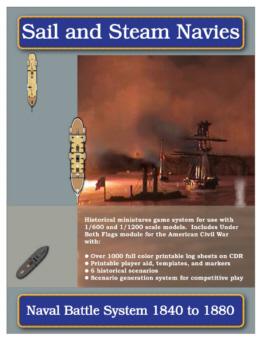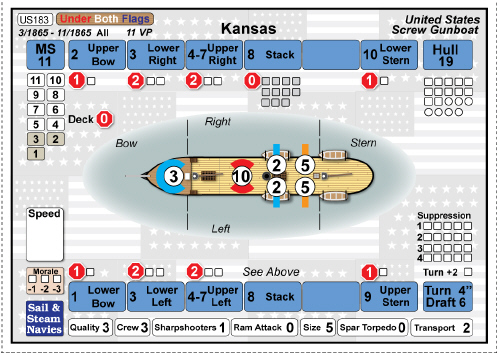|
|
|||||||||||||
 |
|
The Rules Directory only works if you help. Write a review. Get the review template here. |
|
TITLE: Sail and Steam Navies: Naval Battle System 1840 to 1880 AUTHOR: Dave Brandon PUBLISHER: Bay Area Yards PUBLICATION DATE: 2011 WEB SITE/SUPPORT FORUM: Player support can be obtained on the SSN Yahoo group. PRICE (with date): $30.00 (in 2011) REVIEWED BY: Mark “Extra Crispy” Severin PERIOD COVERED: Naval warfare from 1840 to 1880 THE BOOK: Sail and Steam Navies (SSN) is delivered as a PDF either by download or on a CD. The CD contains not just the rules but nearly 1,000 ship data cards for the American Civil War, extended examples of play, advice on building fleets, sample maps and several scenarios. The rules themselves are just 24 pages, not counting two pages of charts. SCOPE: SSN is a game of tactical naval combat from 1840 to 1880. ARMY SIZE: Fleets can be almost any size from one ship to perhaps a few dozen. BASE UNIT: Ships are represented individually. GAME SCALES:
BASING SIZES: Not applicable. TURN SEQUENCE:
GAME MECHANICS: Ship Logs: The book includes nearly 1,000 logs for vessels and forts of the American Civil War. these color coded sheets detail all the gun, speed, armor and other data needed during play.
Orders: For each ship a player must write a Speed Order (SO). This simply indicates how fast the ship will move in each segment this turn. Ships must move at the ordered speed, unless reduced due to damage etc. Once orders have been written they are simultaneously revealed by all players. Cannonade: Players may fire guns at targets that are within range, LOS, and the firing arc of each gun. For each gun the player must also indicate the type of ammunition being fired (shot, shell, or canister). Players then roll a D10 to hit. Guns hit on a 2 at close range, a 5 at medium and an 8 at long. For each hit a D10 is rolled to determine hit location. The locations vary ship by ship and are detailed on each log sheet (see example above). Each section of the ship is numbered (on the Kansas, a location roll of 3 is lower left). There is a small handful of modifiers to the to-hit roll, most of them pertaining to forts. If the gun hits damage is rolled for. Each gun has a Gun Rating. This may be modified by range and ammo type. The gun rolls one D10 per point of gun rating. The armor on a ship is rated by location. The armor rating is subtracted from the gun rating and the net number of dice rolled (minimum of one). There are three kinds of damage: suppression, armor and hull. Depending on the type of fire, and the die roll you will cause one or more hits of each type. Suppression hits affect the target’s effectiveness. Suppression may be removed in the Repair Phase. Each hull hit marks off an armor box on the ship log sheet. Each hull hit causes a hull box to be marked off. To score a critical hit you must roll “triples” when you roll for damage. You then check the hit location and results vary by critical hit type. You may also start a fire on the target vessel. Damage effects and limitations are of the usual kind. Stack hits cause a loss of speed, as do wheel hits. Hit location is modified by the angle of the fire. It is possible to lose masts and rigging for sailing vessels, etc. Critical hits can cause fires, explosions, jammed steering, etc. Musketry: Musketry is resolved identically to cannonade. Small arms have a gun rating of 0 and they can only cause suppression damage. Boarding and Melee: When ships become fouled or grappled, melee between the crews will result. For each point of crew or infantry a player rolls a D10. If suppression hits have been taken this may lower the number of dice rolled. For each 8 to 10 scored, the target marks off a suppression hit. Each side then takes a morale check. If the attacker fails his morale, he has been repulsed. If the defender fails, he surrenders his ship and the attacker takes control of it immediately. If both fail the attacker is repulsed, if both pass they remain engaged though withdrawal is possible. Movement: Movement is a split I Go, You Go. Players roll for initiative. The winner may move first or second in the two movement pulses. The first player then moves all of his ships according to their Speed Order, followed by the second player. They then alternate for a second round of movement in the same order. Each ship has a turn rating which is the distance it must travel in a straight line before the ship may make a 30 degree turn. As this can carry over from turn to turn, use of a small die to track this is recommended. Steam ships may move backwards. For sailing ships, there is a simple Wind Effects Compass rose. (Sailing ships are required to face on of the points of the rose) Your attitude to the wind dictates both your possible speed and ability to turn. Tacking requires a check against crew quality to avoid being In Irons. The rules also cover current (where applicable), towing, running aground and anchoring. Morale: In the morale phase damaged ships and forts may have to check morale if they have suffered damage. A ship or fort that has had all its suppression hits marked off surrenders. To check morale a D10 is rolled. The crew quality is added and other modifiers applied. Modifiers include damage to the ship/fort, being grounded, damage, etc. If the result is 6 or more the check has been passed. If failed, the ship is marked with a withdraw marker. If it is so marked a second time, it surrenders instead. Ships may remove a marker by making a voluntary morale check. Repair: During the repair phase the crew may attempt to put out fires, repair certain critical hits, and recover (remove) suppression hits. A D10 is rolled and the crew quality added to it. If the result is higher than the target number a repair has been effected. Ships may grapple/ungrapple or attempt to unfoul in this phase as well. ARMY LISTS/SCENARIOS: The book contains nearly a thousand data sheets for ships and forts from the Civil War. It also includes the following scenarios:
REVIEWER’S COMMENTS: SSN is a well written, well laid out set of rules. After a single read through I felt I had a good grasp of the rules, and felt I could have played a creditable game with just the charts. The mechanisms are streamlined in just the right way, and I like the consistent dice mechanisms. All dice are D10, most rolls are a single modified die, and you always want to roll high. Only with combat damage do you roll more than one die. As for the ship cards, they are impressive indeed. The detailed deck plans - all in color - and ship date are invaluable. And based on the data and charts in the book it would actually be relatively easy to develop stats for any missing ships, or for ships from other navies. Though I’ll just wait for the supplements that are planned. PLAYER’S COMMENTS: Not played. |
|
[Home] [15mm World] [Reviews Home] [How To] [Beginners Guide] [Gamer's World] [Spanner & The Yank] [Points of View] [The Annex] [Links] [Say Howdy] [Corporate Schill] [Rules Directory] |
 |

